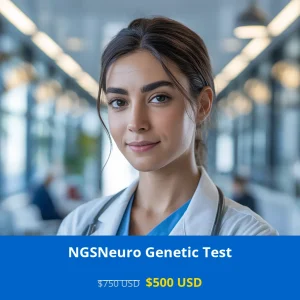GLRB Gene Hyperekplexia NGS Genetic DNA Test
Comprehensive Introduction to Hyperekplexia Genetic Testing
The GLRB Gene Hyperekplexia NGS Genetic DNA Test represents a breakthrough in neurological genetic diagnostics, specifically designed to identify mutations in the glycine receptor beta subunit (GLRB) gene. Hyperekplexia, commonly known as hereditary startle disease, is a rare neurological disorder characterized by an exaggerated startle response to unexpected stimuli. This condition affects the central nervous system’s inhibitory pathways, primarily involving glycine neurotransmission. The GLRB gene plays a critical role in encoding the beta subunit of the glycine receptor, which is essential for proper inhibitory neurotransmission in the spinal cord and brainstem.
Understanding the genetic basis of hyperekplexia is crucial for accurate diagnosis, appropriate treatment selection, and comprehensive family planning. Traditional diagnostic methods often fail to provide definitive answers, making genetic testing an invaluable tool for patients and healthcare providers. Our advanced NGS technology enables comprehensive analysis of the GLRB gene, offering unprecedented accuracy in detecting pathogenic variants associated with this neurological condition.
What the Test Measures and Detects
The GLRB Gene Hyperekplexia NGS Genetic DNA Test utilizes state-of-the-art next-generation sequencing technology to thoroughly analyze the entire coding region and flanking intronic regions of the GLRB gene. This comprehensive approach detects:
- Point mutations affecting glycine receptor function
- Missense and nonsense mutations in the GLRB gene
- Frameshift mutations disrupting protein structure
- Splice site variants affecting mRNA processing
- Small insertions and deletions impacting gene function
The test specifically targets variants known to cause autosomal dominant and recessive forms of hyperekplexia. By examining the complete genetic landscape of the GLRB gene, our test provides clinicians with definitive information about the molecular basis of a patient’s neurological symptoms, enabling precise diagnosis and targeted therapeutic interventions.
Who Should Consider This Genetic Test
Clinical Indications and Symptoms
Individuals experiencing the following symptoms should consider the GLRB Gene Hyperekplexia NGS Genetic DNA Test:
- Exaggerated startle response to unexpected auditory or tactile stimuli
- Generalized stiffness during infancy that improves with age
- Episodic muscle stiffness triggered by sudden movements or surprises
- Family history of hyperekplexia or similar neurological conditions
- Unexplained neonatal hypertonia or stiffness
- Developmental delays associated with abnormal startle responses
- Previous negative results from conventional neurological testing
This test is particularly important for infants presenting with severe hypertonia, children with developmental concerns related to startle responses, and adults with unexplained neurological symptoms that suggest hereditary hyperekplexia. Genetic counseling is recommended before testing to discuss implications and potential outcomes.
Significant Benefits of Genetic Testing
Undergoing the GLRB Gene Hyperekplexia NGS Genetic DNA Test provides numerous advantages for patients and their families:
- Definitive Diagnosis: Provides conclusive evidence for hyperekplexia, eliminating diagnostic uncertainty and reducing unnecessary medical procedures
- Personalized Treatment Planning: Enables targeted therapeutic approaches, including appropriate medication selection and dosage optimization
- Genetic Counseling Guidance: Offers valuable information for family planning and understanding inheritance patterns
- Early Intervention Opportunities: Facilitates timely management strategies that can significantly improve quality of life
- Family Risk Assessment: Identifies at-risk relatives who may benefit from genetic testing and preventive measures
- Research Contribution: Advances scientific understanding of hyperekplexia and related neurological disorders
Understanding Your Test Results
Interpretation and Clinical Implications
Test results are carefully analyzed and interpreted by our team of board-certified geneticists and neurologists. The report includes:
- Positive Result: Identification of a pathogenic or likely pathogenic variant in the GLRB gene confirms the diagnosis of hereditary hyperekplexia. This result provides definitive evidence for the condition and guides appropriate treatment strategies.
- Negative Result: Absence of known pathogenic variants in the GLRB gene suggests that hyperekplexia may not be caused by mutations in this specific gene. Further genetic testing for other hyperekplexia-related genes may be recommended.
- Variant of Uncertain Significance (VUS): Identification of genetic changes with unknown clinical significance. These results require careful clinical correlation and may benefit from family studies.
All results include detailed clinical correlations, treatment recommendations, and genetic counseling guidance. Our genetic counselors are available to help patients and families understand their results and make informed healthcare decisions.
Test Pricing and Availability
| Price Type | Amount (USD) |
|---|---|
| Discount Price | $500 |
| Regular Price | $700 |
Test Specifications
- Turnaround Time: 3 to 4 Weeks
- Sample Type: Blood, Extracted DNA, or One Drop Blood on FTA Card
- Testing Method: Next-Generation Sequencing (NGS) Technology
- Specialty: Neurology and Genetics
- Department: Genetic Diagnostics
- Disease Category: Neurological Disorders
Nationwide Testing Availability
We proudly serve patients across the United States with convenient testing locations in all major metropolitan areas including New York, Los Angeles, Chicago, Houston, Phoenix, Philadelphia, San Antonio, San Diego, Dallas, San Jose, Austin, Jacksonville, Fort Worth, Columbus, San Francisco, and many more. Our network of certified collection centers ensures accessible testing for patients nationwide.
Pre-Test Requirements and Preparation
Before undergoing the GLRB Gene Hyperekplexia NGS Genetic DNA Test, patients should complete the following:
- Provide comprehensive clinical history detailing neurological symptoms and family medical background
- Participate in a genetic counseling session to discuss test implications and create a detailed pedigree chart
- Review informed consent documents explaining test purpose, potential outcomes, and privacy protections
- Discuss insurance coverage and payment options with our billing specialists
Take Control of Your Neurological Health Today
Don’t let uncertainty about neurological symptoms affect your quality of life. The GLRB Gene Hyperekplexia NGS Genetic DNA Test provides the clarity needed for accurate diagnosis and effective treatment planning. Our team of neurological genetics specialists is ready to help you understand your condition and develop personalized management strategies.
Call or WhatsApp us today at +1(267) 388-9828 to schedule your genetic testing appointment. Our genetic counselors will guide you through the testing process and answer all your questions about hyperekplexia genetic testing. Take the first step toward definitive diagnosis and personalized care by booking your test now.







